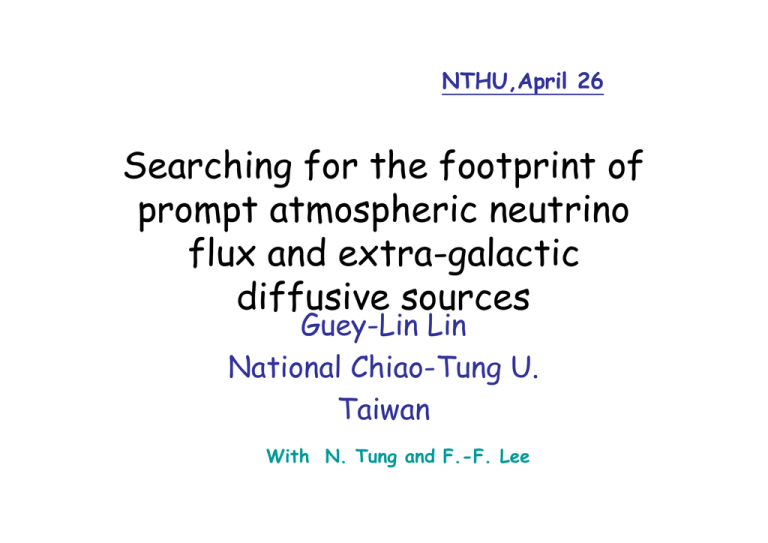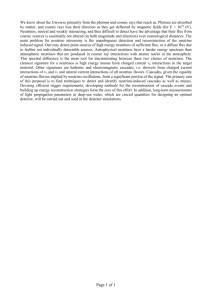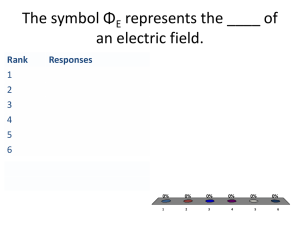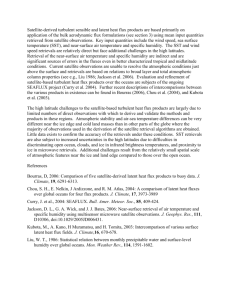Searching for the footprint of prompt atmospheric neutrino flux and extra-galactic diffusive sources
advertisement

NTHU,April 26 Searching for the footprint of prompt atmospheric neutrino flux and extra-galactic diffusive sources Guey-Lin Lin National Chiao-Tung U. Taiwan With N. Tung and F.-F. Lee Charm hadrons live much shorter than π, K. Neutrinos produced by their decays are called prompt neutrinos. Plotted are fluxes of down-going νμ H. Athar, F.-F. Lee and G.-L. Lin, Phys. Rev. D 2005 The π, K production cross section taken from T. K. Gaisser, Astropart. Phys. 2002 These are neutrinos from π and K decays, so called conventional componenta background to the prompt component. T. K. Gaisser and M. Honda, Annu. Rev. Nucl. Part. Sci. 2002 •The background issue in the νe case is less severelook for prompt νe J. F. Beacom and J. Candia JCAP 2004. •We observe that, in the conventional component, angular dependence increases with the energy. The prompt component is however isotropic! The signature of prompt neutrinos and beyond • Looking for shower signals from down going νe with muon veto. • Observe the excess to the conventional atmospheric neutrino flux. • Study the angular dependence of observed flux. Look for its deviation to the angular dependence of the conventional atmospheric neutrino flux. The shower signature • CC ν e + N → e − + X EM + Hadronic NC ν e + N →ν e + X Hadronic •NC ν μ + N → ν μ + X , suppressed by y ( γ -1) × σ NC /σ CC enhanced by flux, y ≈ 0.3 − 0.4, γ ≈ 3 − 3.7 ν τ + N →ν τ + X , suppressed due to smallν τ flux • CC ν τ +N → τ − + X : suppressed due to the small ν τ flux. All signatures are included in our calculations. The production of prompt atmospheric neutrinos Primary comic ray proton spectrum φ p (E p ) ≡ dN p / dE p , ( T. K. Gaisser and M. Honda, 2002 ( φ p (E p ) = 1.49 ⋅ E p + 2.15 ⋅ exp − 0.21 E p )) − 2.74 in the unit cm-2s-1sr-1GeV-1. Contributions from heavier nuclei do not affect our results based upon angular distribution. p + Air → charm hadron (h) + X h : D ± , D0 ,D s , Λ c h →ν + Y Tau neutrino only come from Ds decays. Φ prompt (ν e ) : Φ prompt (ν μ ) : Φ prompt (ν τ ) = 1 : 1 : 0.1 The absolute flux of prompt neutrinos are very model dependent. NLO QCD with MRSG parton distribution function M. Thunman, G. Ingelman and P. Gondolo, Astropart. Phys. 1996 RQPM: non-perturbative E. V. Bugaev et al. Phys. Rev. D 1998 νe OSC Vertical down-going νe flux νe Horizontal coming νe flux Event number spectra for 3 years of datataking in km3 water Cherenkov detectorcosθ=[0.5,1] GRB flux Eli Waxman and John Bahcall Phys. Rev. D 1998 Event number spectra for 3 years of datataking in km3 water Cherenkov detectorcosθ=[0,0.5] Ratio(R)=Small zenith/Large zenith For Ec=105 GeV, R=0.13 with only conventional atm. flux, R=0.17 with PQCD-calculated prompt atm. flux included R=0.28 with RQPM-calculated prompt atm. flux included R=0.21 with RQPMFS-calculated prompt atm. Flux included Ec=105 GeV, 10 years of data taking (Icecube) Conventional and prompt in blue and red respectively Model PQCD RQPM RQPM -FS Small zenith (9.8 angle 3.6 ) (9.8 16) (9.8 7.5) Large zenith (75 angle 3.6) S/L≡R 0.17 (75 16) 0.28 (75 7.5) 0.21 R=0.13 For conventional atmospheric ν’s. Ec=2.5x105 GeV, 10 years of data taking conventional and prompt in blue and red respectively Model PQCD RQPM RQPM -FS Small (1.1 zenith 1.1) angle (1.1 4.4) (1.1 2.2) Large (10 zenith 1.1) angle (10 4.4) (10 2.2) S/L≡R 0.20 0.38 0.27 R=0.11 atmospheric ν’s. Ec=5x105 GeV, 10 years of data taking Conventional and prompt in blue and red respectively Model PQCD RQPM RQPM -FS Small zenith (0.23 angle 0.4) (0.23 1.9) (0.23 0.88) Large zenith (2.3 angle 0.4) S/L≡R 0.24 (2.3 1.9) 0.51 (2.3 0.88) 0.35 R=0.10 For conventional atmospheric ν’s. The effect from GRB flux Eli Waxman and John Bahcall Phys. Rev. D 1998 Ratio(R)=Small zenith/Large zenith R=0.13 for conv. Atm.. Ec=105 GeV, 10 years of data taking Model PQCD RQPM RQPM GRB -FS alone Small zenith angle Large zenith angle S/L≡R (9.8 3.6 ) (9.8 16) (9.8 7.5) 14 (75 3.6) (75 16) (75 7.5) 14 0.17 0.28 0.21 with GRB 0.30 0.38 0.32 R=0.11 for conv. Atm.. Ec=2.5x105 GeV, 10 years of data taking Model PQCD RQPM RQPM GRB -FS alone Small zenith angle Large zenith angle S/L≡R (1.1 1.1) (1.1 4.4) (1.1 2.2) (10 1.1) (10 4.4) (10 2.2) 0.20 0.38 0.27 with GRB 0.52 0.59 0.55 7.4 7.4 Ec=5x105 Model GeV R=0.1 for Small Conv. Atm. PQCD (0.23 zenith 0.4) angle Large (2.3 zenith 0.4) angle S/L≡R 0.24 with GRB 0.7 RQPM RQPM- GRB alone FS (0.23 (0.23 4.2 1.9) 0.88) (2.3 1.9) (2.3 0.88) 0.51 0.35 0.75 0.72 4.2 Conclusions • We have proposed to identify prompt atmospheric neutrinos and neutrinos from extragalactic sources through the angular dependencies of measured shower events with muon veto. • We pointed out that, for conventional atmospheric neutrinos, the ratio of shower event between small (0 to 60 degrees) and large zenith angles (60 to 90 degrees) decreases monotonically as we raise the shower energy threshold. Continued • In contrast, both the prompt atmospheric neutrino flux and the neutrinos from extra-galactic diffusive sources are isotropic. Their presence raises the above-mentioned ratio. • The identification of prompt atmospheric neutrinos is more likely with RQPM charm-production model. Certainly an updated PQCD calculation for prompt atmospheric neutrino flux is very much needed. • The detection of GRB neutrino flux is promising if this flux does exist. The angular distribution of neutrino flux is altered significantly by the presence of GRB neutrino flux. continued • On the other hand, GRB flux dominates that of prompt atmospheric neutrinos at the energy range where both of them emerge from conventional atmospheric neutrino background. • A parallel analysis with respect to the detection of upcoming muon neutrino flux is underway. The upcoming ν flux is subject to more severe background and Earth attenuation effect. However, the range of high energy muon makes up some of the suppressions.





